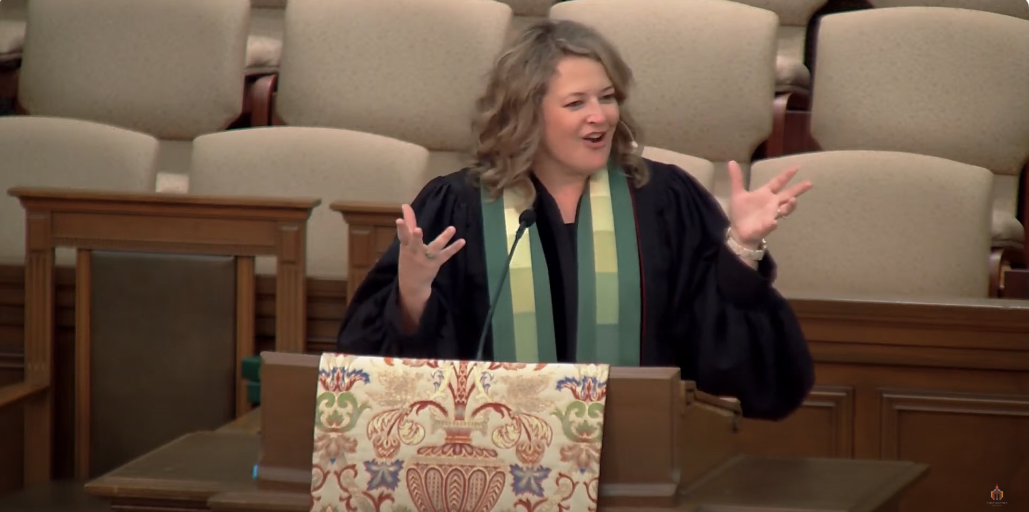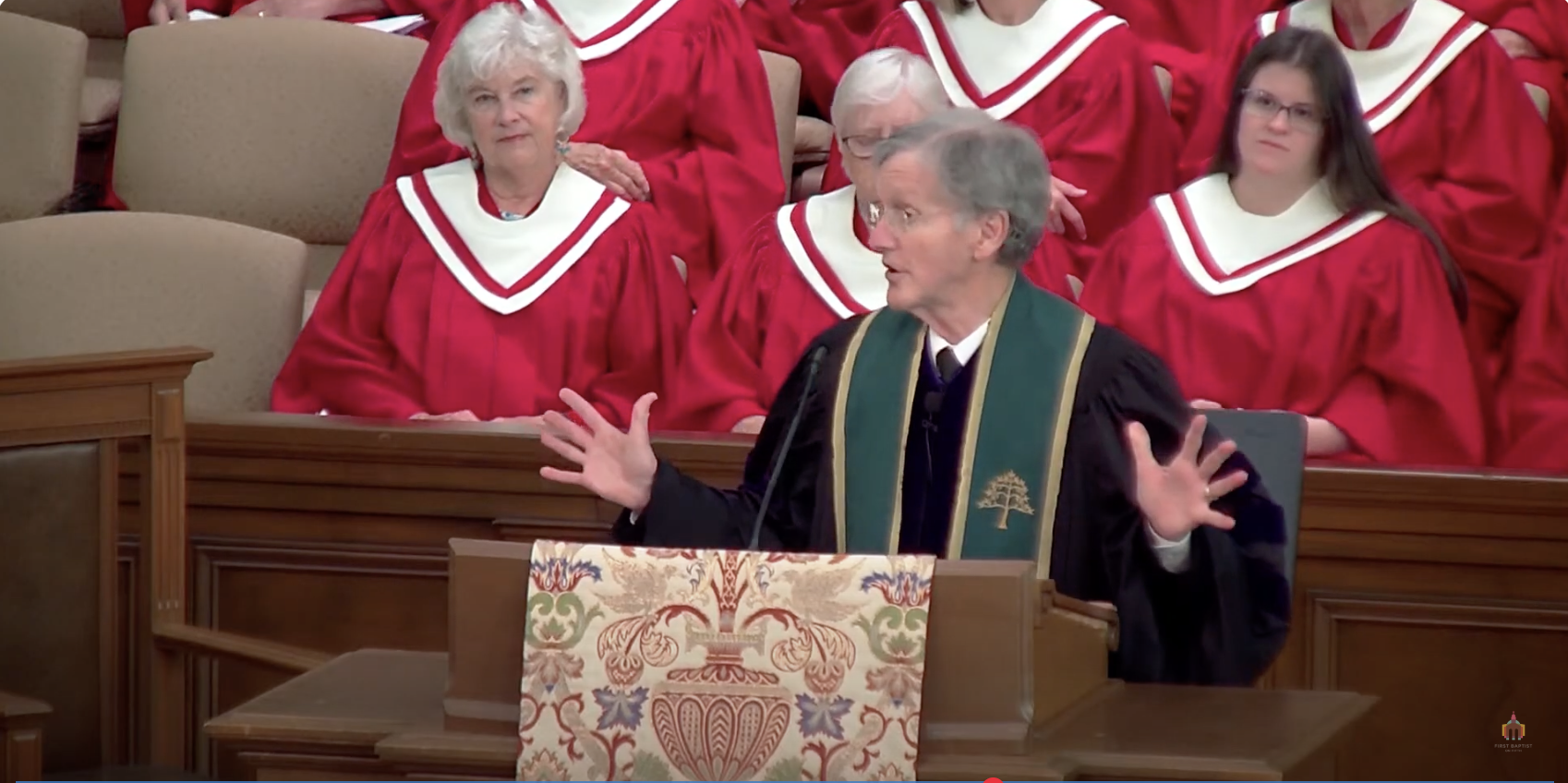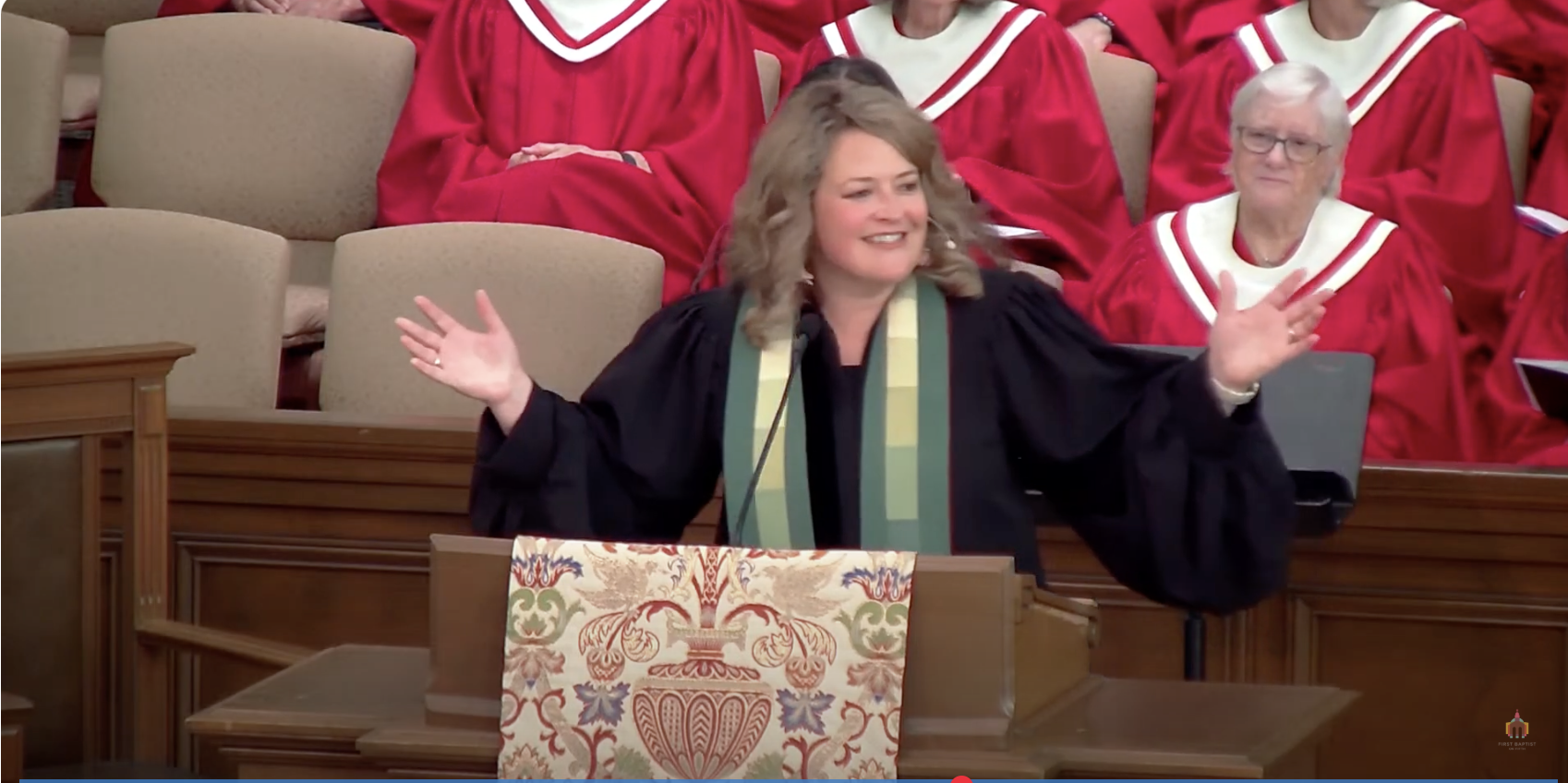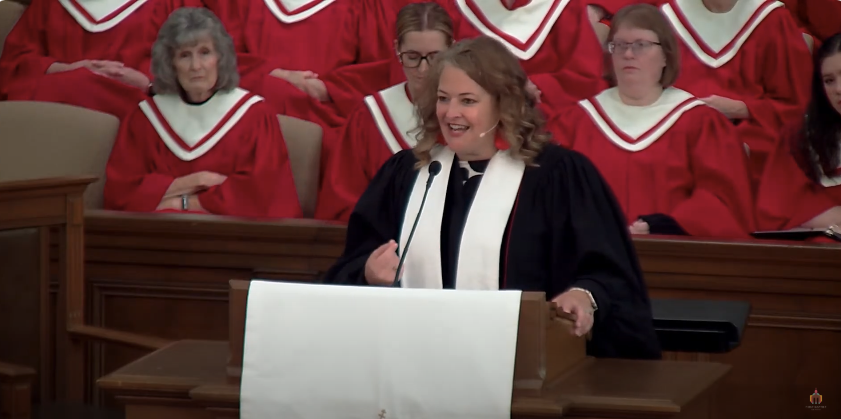In 1813 Methodist circuit rider Peter Cartwright wrote of religion along the Cumberland River:
We preached in new settlements, and the Lord poured out his Spirit, and we had many convictions and many conversions. It was the order of the day, (though I am sorry to say it,) that we were constantly followed by a certain set of proselyting Baptist preachers. These new and wicked settlements were seldom visited by these Baptist preachers until the Methodist preachers entered them; then, when a revival was gotten up, or the work of God revived, these Baptist preachers came rushing in, and they generally sung their sermons; and when they struck the long roll, or their sing-song mode of preaching, in substance it was “water!” “Water!” “You must follow your blessed Lord down into the water!”. . .. Indeed, they made so much ado about baptism by immersion, that the uninformed would suppose that heaven was an
That’s us! Indeed, for some people then and now, Baptists will never be more than a bunch of fanatical, soul-ruining, river-defiling dippers! Now indulge me: “Every head bowed, every eye closed, no one looking around.” How many of you have ever felt at least a little embarrassed to call yourself a Baptist? Raise your hands. To those who lifted your hands, thanks for your honesty. The rest of you may be fibbing!
Now get over it. The earliest Baptists started out a despised minority, like, well, the earliest Christians. And like the early Christians they were obsessed with equality before God; claiming Paul’s words to the Galatians: For freedom Christ has set us free. Stand firm, therefore, and do not submit again to a yoke of slavery. For you were called to freedom, brothers and sisters; only do not use your freedom as an opportunity for self-indulgence, but through love become slaves to one another. For the whole law is summed up in a single commandment, “You shall love your neighbor as yourself.”
Which brings us back to the early Baptists: They are not absolute models to which we should return, but spiritual guides who help us understand ourselves and our witness in the world. In 1609 some English Puritans exiled in Amsterdam, constituted their new community around personal faith and believers’ baptism. Two years later, on their way back to London they united around these haunting words:
That the church of Christ is a company of faithful people separated from the world by the word & spirit of God, being knit unto the Lord, & one another, by Baptism upon their own confession of the faith and sins.[1]
Four centuries later do you hear your church in that wonderful statement? I hope so. At our best, that’s who we still are. Knit together unto Jesus and one another.
Baptists began with an audacious faith. Membership in the church, they said, is grounded in an experience of grace, not geography. Baptism should be administered on the basis of one’s own “confession of faith and sins,” not enforced by the state-based or culture-privileged religious establishment of a so-called Christian nation! Do you understand how radical that idea was in seventeenth century Europe where citizenship and church membership were linked inseparably? These Baptists gazed at their world and saw what many of their contemporaries overlooked: A Believers’ Church, where no one could claim membership save those who professed faith for themselves, uncoerced by state or religious establishments. There are no Christian nations, they insisted, only Christian people, bound to Christ not by citizenship but by faith.
How might their audacious identity impact us? First, we Baptists should welcome everyone who comes to us, whatever their faith or lack thereof, but we encourage all who would claim membership to profess faith in Jesus Christ. With those early Baptists we too must make our “own confession of faith and sins.” You can’t confess your faith if you won’t confess your sins. Contrary to much popular preaching in our religious culture, grace is not an entitlement; it is a gift by which we cast ourselves on Christ and acknowledge our brokenness in the audacity that God’s New Day is indeed within our reach.
Second, like the early Baptists, we 21st century Dippers have an audacious calling. Like our 17th century forebears, we cannot take it for granted that people in postmodern North America, even those who show up in church, have the slightest idea of what we are talking about. The most recent survey of American religion suggests that the largest “religious” group in the country, at 29% of the population, are the “nones” the folks who say they have no religious affiliation. So we have to keep retelling the “old, old story,” explaining through traditions old and new why we think faith and baptism are wonderfully important in a human life. We nurture our children and grandchildren toward faith even as we seek to live out the “Jesus story” in a culture where one in five persons (one in three persons’ ages 18-30) claim no religious affiliation whatsoever.
Some of us got saved hard, sweating our way to salvation as if we’d been to hell one afternoon and had come back to tell about it; others were guided by spiritual mentors who nurtured Jesus into us along the way; still others broke through to grace after incessant struggles with life’s outer or inner horrors, and others of us don’t know exactly how Jesus ever found us, we just know he did. The entry points to grace are vast and varied. Our calling is to the Jesus Story wherever it finds us.
Third, that audacious faith demands an audacious witness. Nineteenth
century British historian Edward Underhill, insisted that “a distinguishing . . . trait” of the early Baptists was their claim, “for the church and for the conscience, of freedom from all human control.”[2] That freedom in the Baptist witness found its way into the hearts and lives of slaves, even when their white enslavers tried to keep it from them. Mechal Sobel’s wonderful book: Trabelin’ On: The Slave Journey to an Afro-Baptist Faith says that Baptists drew large numbers of slaves because of the “revolutionary equality” preached at Baptist revivals and camp meetings, a conversion so powerful that many slave converts called it “holding the wind.” Indeed, enslaved Baptist preachers were often beaten for preaching the “freedom of the soul.” Do you get it? The gospel witness of the freedom of salvation was so great that even the enslavers could not keep from the people they held in bondage.[3]
A church without a witness is a church without an identity whatever name it may call itself. Worship is witness sure enough. Worship links “ordinary time” and “sacred time” day to day, week to week. Baptism and the Lord’s Supper are witness, the word of God without words, enacting the promise of God’s presence in our midst. Feeding the hungry, clothing the naked, binding up the broken and calling persons to faith is at the heart of the church’s continuing witness, beyond doubt.
But when the witness and conscience collide, what then? Then we are called to the Baptist tradition of dissent. The “freedom to which Christ has set us free” sometimes calls us to dissent. Today’s Galatians text gives the warning: “Now the works of the flesh are obvious: fornication, impurity, licentiousness, idolatry, sorcery, enmities, strife, jealousy, anger, quarrels, dissensions, factions, envy, drunkenness, carousing, and things like these. I am warning you, as I warned you before: those who do such things will not inherit the kingdom of God.” What does that sound like? Sounds like last week in the land of the free and the home of burgeoning cruelty.
At the Cooperative Baptist Fellowship last week in St. Louis, moderator and Virginia pastor Juan Garcia called Baptists to “Dissent against any ideology that seeks to replace Christ … with political power, nationalism, lies or fear,” “This dissention,” he said, “is not optional. It is foundational to those who follow Christ, who embraced and included all, especially those whom social systems rejected and excluded.” He asked:
“Will we defend the dignity of immigrants, the hungry, the homeless, the poor, the elderly, the marginalized — those being dehumanized and demonized by elected officials?”
And sometimes dissenters take us by surprise. Several summers ago I was preaching at First Baptist Church, Asheville with a text that had to do with eschatology. I’d been reading about various theories of the second coming and brazenly declared that should the “rapture” occur while I’m still in the world, I’m not going. Rather, I decided to stay right here with Jesus who told about the shepherd who would not give up until the last, lost one got home. After the service, I stood around and shook hands with folks, some of whom took me to task for trashing premillennial theology. At the end of the line, however, was this gangly teenager who was probably sixteen or seventeen. He shook my hand, looked me straight in the eye and declared: “I liked your sermon, and if it’s ok I’d like to stay here with Jesus too.” His words echoed in my head and heart most of the two-hour drive home from Asheville. Tears too. That young man and his conscience carried me beyond my sermonic rhetoric to gospel action. Good grief, I thought, that kid made me believe what I was saying. He’s a hope for the Baptist future, till the last, lost one gets home.
Don’t confront that future by asking whether your church is declining, growing, or dying. Begin by asking whether you have a witness in the world, a witness that is helping you to THRIVE—to be energized by your own participation in God’s New Day; let’s quit fretting over lost culture dominance and turn loose our consciences. Let’s renew our covenant in one of the church’s often dysfunctional, but grace-filled families. In the Water and the Word, at Christ’s Table and the kitchen table, we are God’s Old/New community, KNIT together, knit together, knit together—by grace. Amen.





